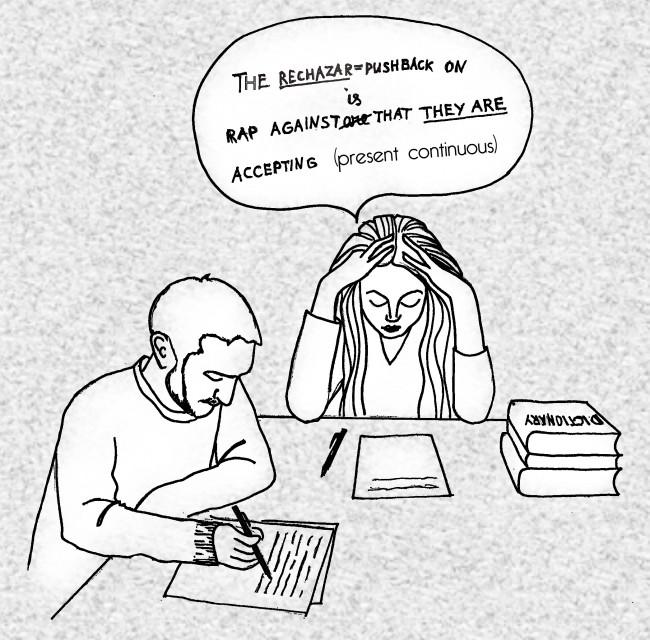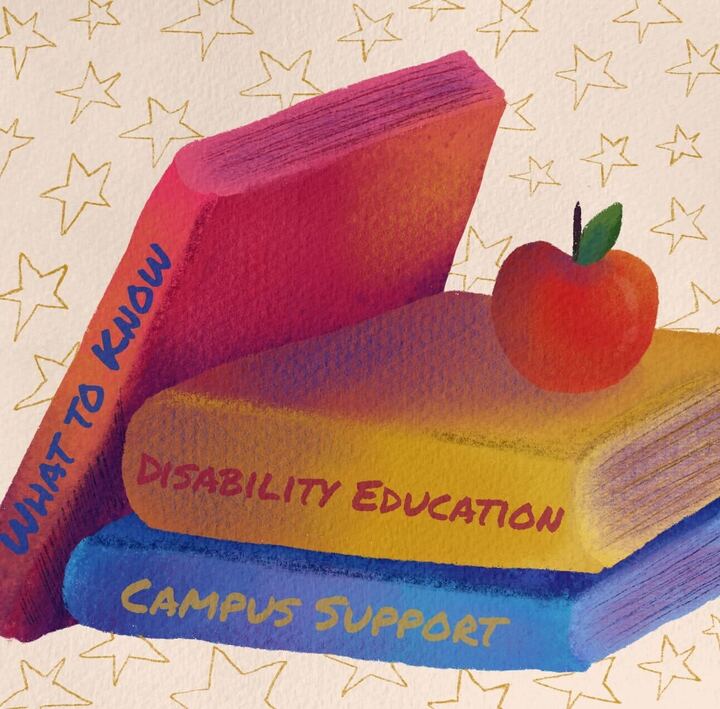
While other American students were hanging out with their friends, I was putting many, many more hours into studying. To understand and pass my classes, I have to resist various temptations like playing video games, watching movies and meeting up with my friends.
Why must I shorten my social life to this degree? The reason lies in the various cultural barriers that plague me as an international student.
The four necessities in knowing a language are writing, speaking, listening and reading. As a journalism student, all four skills are especially important because I need to interview people and take great notes in order to express often complicated information in a way readers can easily understand.
Lost in Translation
The cultural barrier often prevents me from having enjoyable conversations with others because I don’t understand the underlying connotations of many words and phrases.
I once attended a class at Glendale Community College and forgot to bring an eraser for an exam. I asked a nearby American student if I could borrow one.
“Excuse me,” I whispered. “May I borrow your rubber?”
“Rubber? Please go to the health center and get one,” he said laughingly.
I was confused because I didn’t know what he meant.
After the exam, I immediately searched for the underlying meaning of “rubber.” I was shocked because I couldn’t imagine that the word rubber could be related to sex. I was very embarrassed when I returned the eraser to him.
Struggling with a second language
The language barrier is one of the biggest challenges to many international students studying in a foreign country.
According to a research study about international students’ adjustment problems by Jerry Gebhard, a professor of English education at Pusan National University, international students confront a myriad of challenges associated with academics, social interaction and emotions.
“I was excited by the new environment, but also getting depressed for heavy study load and feeling fear to talk with others because of my poor English,” said Fangfang Gao, an international student studying journalism at the University of Florida. “I’ve talked this with some other international students, and most of them have been in the same situation.”
Since journalism requires a good handle of English, I heavily rely on an electronic dictionary due to my language limitation. It bails me out of predicaments when I read textbooks, scholarly journals and newspaper articles.
When I am writing a story, I always need to use my dictionary to translate a Chinese word into an English word because I don’t know how to express the meaning in a second language. As a result, for an article of about 800 words, I need about 18 hours to finish because I have to constantly translate. Though time consuming, it is worthwhile because I can learn plenty of new words every time.
Unfortunately, my electronic dictionary cannot help me during a conversation. When I am working on a project with other American students in a face-to-face discussion, a communication gap is inevitable.
To hide my poor language ability, I sometimes pretend to understand what the students say by nodding and saying something like “you’re right” or “this is a good idea” for fear that they would feel annoyed if I always asked them to repeat or rephrase their words.
Overcoming fear through jouralism
Some Asian students feel disappointed and worried about their inability to socialize with Americans when they first meet. Unfortunately, I was one of those students.
However, as a journalism student, I had to overcome my shyness and fear because interviewing is necessary when I cover a story.
Before I interview people, I always need to ask them whether I am allowed to record the interview because I am unable to take good notes quickly. Likewise, I do the same routine during lectures. Even though I recorded the lecture, I need to listen to the recording at least five times in order to comprehend what the professor said. If some professors don’t allow lecture recording, I have no choice but to ask other students for help.
Journalism requires multitudes of writing. A tiny misspelling may lead to a terrible error because it can distort facts. I need to be very careful when I proofread my story.
On top of it all, I have to pay special attention to the news every day to keep track of current issues. For a typical news story, an American student spends only a few minutes in reading it. Because of my limited vocabulary, I need to use the dictionary frequently and spend more than 15 minutes to finish reading.
The long term side effects of ESL programs
Since journalism requires an excellent grasp of the English language, English as a Second Language (ESL) programs can help me understand and pass my journalism classes because it helps to correct many of my grammatical mistakes. As a journalist, grammar errors are unacceptable professionalism.
However, ESL programs are useful to international students in the short term, but not the long term. As stated in the online journal for teachers of ESL, numerous studies have shown that focusing much importance on grammatical correction in ESL writing classes can be detrimental to students’ writing ability, performance and development.
Research showed that international students who don’t receive immense grammar corrections have a more positive attitude towards writing and write with more complexity than those who receive them.
I remember my first paper in my ESL writing class was full of grammatical corrections ranging from tenses, prepositions, articles and punctuation. When I noticed countless red marks on my paper, I was very discouraged. It greatly made me lose motivation to learn English well.
Moreover, the time spent by students and teachers on correcting grammatical errors contributes to the disregard of other important elements of writing such as storytelling, sentence structure, perspective and logical development of content. Even now when I proofread, what immediately springs to my mind is grammatical revision instead of checking the organization and structure.
Useful resources for international students
Fortunately, CSUN provides adequate resources to help international students incorporate into a new culture.
The International and Exchange Student Center always invites guest speakers including former international students and professionals to share their experience about how they surmount the cultural difference and social problems in a foreign country.
“I have attended their talks several times, and they were very enlightening,” said Bader Aljeraiwi, an international student from Dubai who majors in economics. “They reminded me of different taboos and certain rules in the United States, which are helpful for me to get involved.”
The Learning Resource Center provides various learning programs and supplemental instructions classes to help students improve their English and writing skills.
“The tutors are very patient to students, especially international students,” said Oscar Kwong, an international student majoring in cinema and television arts. “What impressed me most was that one of the tutors has spent an extra hour in talking about my history term paper although the center was closed.”





